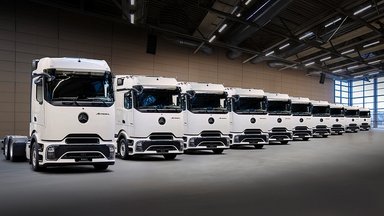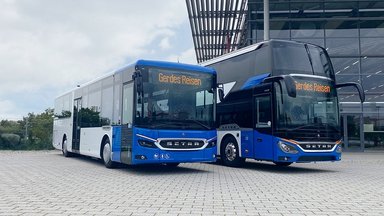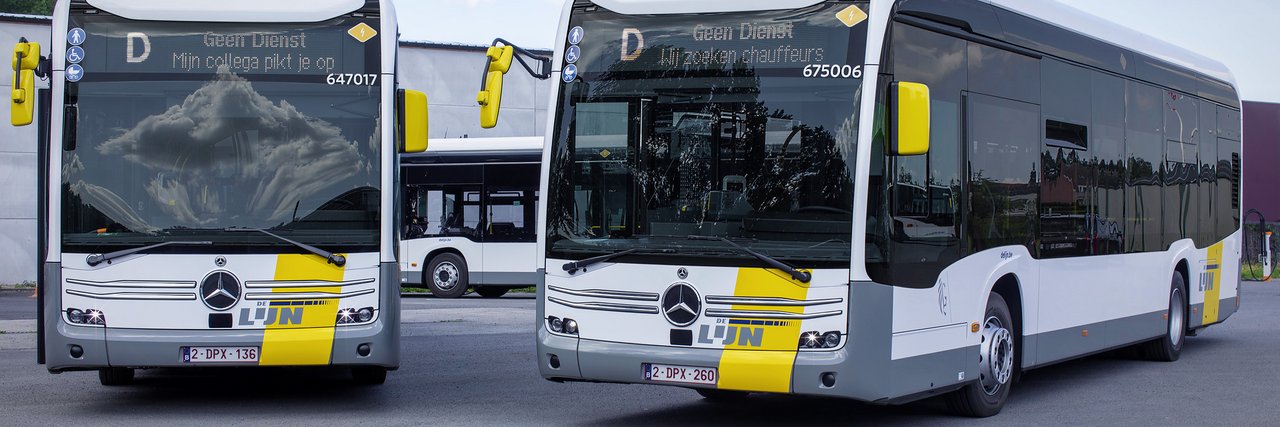
Introduction of eMobility in Belgian regional transport: Ferry Cars deploys five Mercedes-Benz eCitaro buses
Download
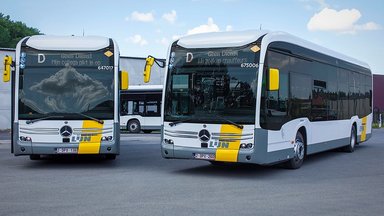
Introduction of eMobility in Belgian regional transport: Ferry Cars deploys five Mercedes-Benz eCitaro buses
Ferry Cars Group is the first Belgian public transport operator to test the function of electric regional public transport in practice Pilot project to implement the Flemish government's environmental objectives Five all-electric Mercedes-Benz eCitaro city buses with the latest NMC3 battery generation are running quietly and reduce CO2 emissions Sideguard Assist, Preventive Brake Assist and reversing camera increase safety for…
- Ferry Cars Group is the first Belgian public transport operator to test the function of electric regional public transport in practice
- Pilot project to implement the Flemish government's environmental objectives
- Five all-electric Mercedes-Benz eCitaro city buses with the latest NMC3 battery generation are running quietly and reduce CO2 emissions
- Sideguard Assist, Preventive Brake Assist and reversing camera increase safety for drivers and passengers
Leinfelden-Echterdingen / Eeklo (Belgium) - The regional public transport operator Ferry Cars from Belgium has put five new Mercedes-Benz eCitaro low-floor city buses with all-electric drive into operation. The operator, based in the city of Eeklo, which is located in the north of the Belgian province of East Flanders in the Meetjesland region between Ghent and Bruges and thus close to the border with the Netherlands, uses the locally emission-free and quietly running 12-metre electric buses in the regional public transport of Belgium's largest local public transport companies De Lijn and TEC (Transport en Commun).
Ferry Cars is the first Belgian public transport operator to test the function of electric regional public transport deployment in practice. "Our fruitful collaboration with Daimler Buses started more than 20 years ago; this has given us the confidence to be the first Belgian company to order the eCitaro," explains Pieter Lanssens, CEO of Ferry Cars.
Practical testing of the eCitaro in regional transport supports environmental objectives
By 2030, the Flemish government aims to reduce CO2 emissions by 35 percent. Mobility must make a significant contribution to this. For Ferry Cars, the purchase of the five all-electric eCitaro buses is a pilot project to test how electric regional public transport can be optimally implemented in practice. The public transport company expects that this proactive approach will enable it to fully meet the government's environmental objectives for public transport even before mandatory obligations and regulations will be introduced in 2025.
Overall package of sustainability and safety in regional public transport
The eCitaro buses from Ferry Cars feature the latest NMC3 battery generation with improved cell chemistry. The modular design of the high-performance battery equipment combined with the enormous performance of the batteries enable a long range.
The batteries are charged via charging cable after each tour or between two tours at one of a total of eight charging stations at Ferry Cars. "In this way, we are gaining intensive experience about the decisive factors for establishing an economical electric public transport operation in regional public transport as well, and this knowledge will certainly determine the upcoming expansion of our fleet in the future," Pieter Lanssens emphasises. Chief Operating Officer Bart De Koster adds: "We currently achieve an attractive autonomy of up to 320 kilometres per bus. Nevertheless, we are already engaged in the development of a controlled charging system, which will be indispensable for the network expansion with more electric buses in the future."
However, not only sustainability aspects but also efficient measures to increase the safety of drivers, passengers and other – particularly more vulnerable - road users play an important role in Ferry Cars' decision for the eCitaro. The five new electric buses are therefore equipped with the Sideguard Assist and Preventive Brake Assist assistance systems and dispose of a reversing camera.
About Ferry Cars
The roots of Ferry Cars go back to the 1920s. Today, the companies of the Ferry Cars Group are mainly active in East and West Flanders, in the province of Hainaut and in Walloon Brabant. The bus fleet comprises around 150 vehicles, about half of which bear the Mercedes star. In addition to buses from the Mercedes-Benz Conecto, Citaro LE and Citaro G series, the company has already taken the first steps towards sustainability with the procurement of Citaro hybrid articulated buses as from 2019. To date, a total of 14 of these articulated hybrid vehicles have been integrated into the fleet. With the commissioning of the five new eCitaro solo buses, Ferry Cars is consistently continuing the measures to reduce its ecological footprint.
Article assets
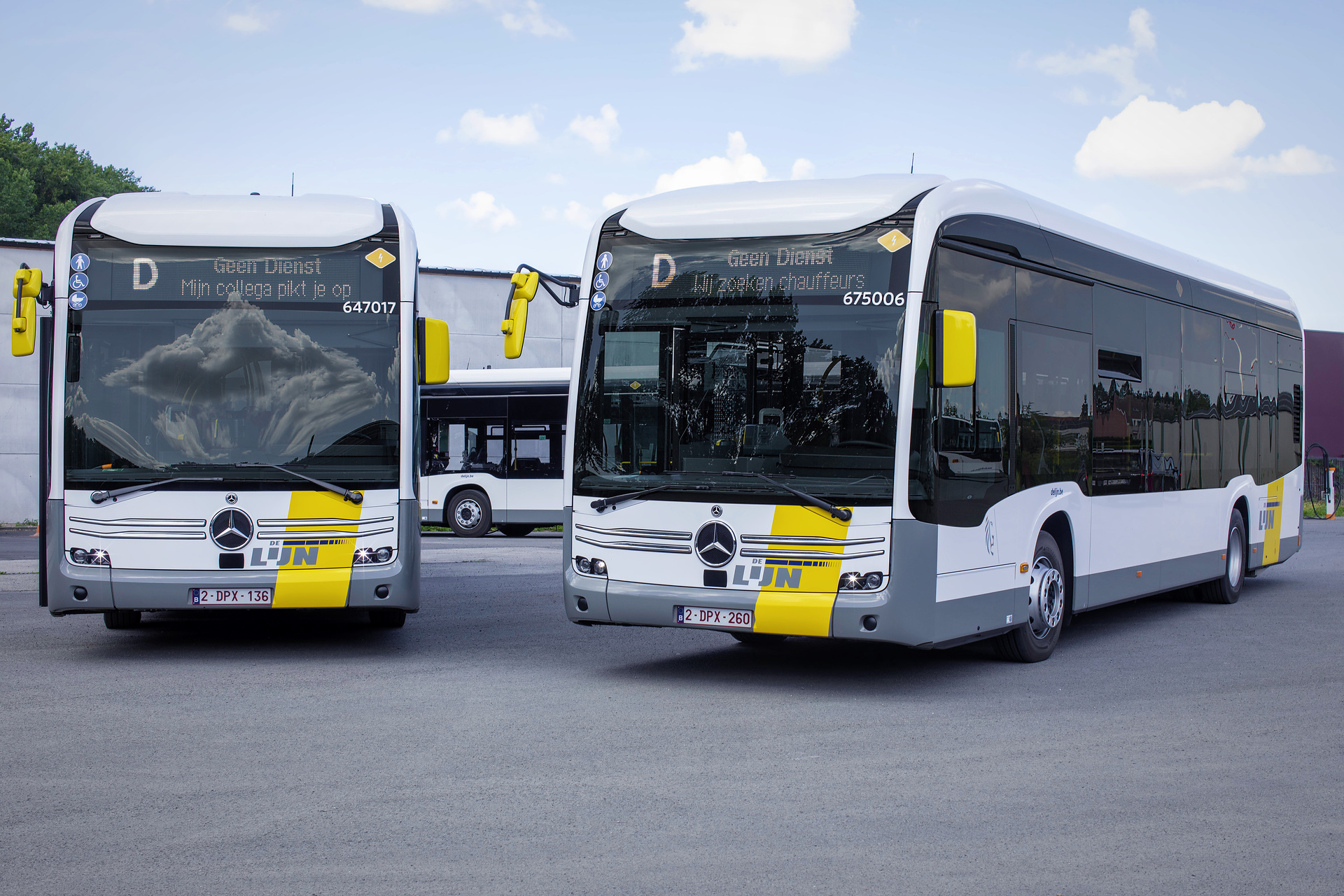
Introduction of eMobility in Belgian regional transport: Ferry Cars deploys five Mercedes-Benz eCitaro buses

Introduction of eMobility in Belgian regional transport: Ferry Cars deploys five Mercedes-Benz eCitaro buses

Introduction of eMobility in Belgian regional transport: Ferry Cars deploys five Mercedes-Benz eCitaro buses
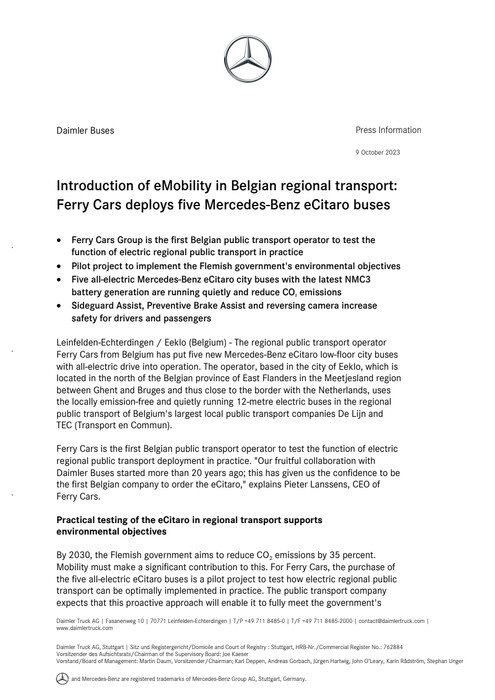
Introduction of eMobility in Belgian regional transport: Ferry Cars deploys five Mercedes-Benz eCitaro buses

Introduction of eMobility in Belgian regional transport: Ferry Cars deploys five Mercedes-Benz eCitaro buses

Nada Filipovic
Spokesperson Mercedes-Benz Buses
nada.filipovic@daimlertruck.com
+49 160 8614813

Peter Smodej
Head of Communications Product & Corporate Mercedes-Benz Trucks / Daimler Buses
peter.smodej@daimlertruck.com
+49 176 30936446






